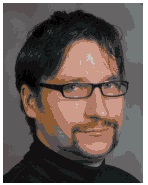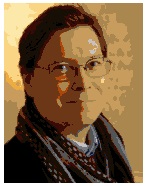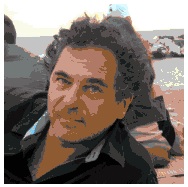Keynotes Speakers
Invited Talk 1: Music, Research, Education, and Contemplative Practice--Many Faces of L2Ork
Ivica Ico Bukvic
Abstract: Linux Laptop Orchestra (L2Ork) is by far the most demanding undertaking of my creative career. Not only has it reshaped my creative focus, it has also redefined the very core values that have been the driving force behind my creativity for more than a decade. Perhaps its most compelling influence was the dramatic shift away from individual to communal, away from “virtual” to human-centric, resulting in a seamless fusion of sound and motion. Since, L2Ork has become much more than an ensemble--a hub for research and educational outreach, as well as a vehicle for contemplative art. Consequently, I would like to use this opportunity to share with the audience L2Ork’s exhilarating journey, important lessons I learned along the way, and a vision of what I see as the future of human-centric and ensemble-driven computer music.
 Ivica Ico Bukvic é doutor pela College-Conservatory of Music, de Cincinnati (USA) e Professor
Associado na Virginia Tech, atuando na área de tecnologia musical. É fundador e diretor do Digital
Interactive Sound and Intermedia Studio (DISIS) e da primeira Orchestra de Laptops em ambiente Linux
do mundo (L2Ork). É coordenador do Institute for Creativity, Arts, and Technology (ICAT) e do
Integrative Mind & Performance Through the Arts, Creativity, and Technology (IMPACT) Studio. É também membro do Center for
Human-Computer Interaction (CHCI) e professor visitante nos departamentos de Ciência da Computação e
da Escola de Artes Visuais
Ivica Ico Bukvic é doutor pela College-Conservatory of Music, de Cincinnati (USA) e Professor
Associado na Virginia Tech, atuando na área de tecnologia musical. É fundador e diretor do Digital
Interactive Sound and Intermedia Studio (DISIS) e da primeira Orchestra de Laptops em ambiente Linux
do mundo (L2Ork). É coordenador do Institute for Creativity, Arts, and Technology (ICAT) e do
Integrative Mind & Performance Through the Arts, Creativity, and Technology (IMPACT) Studio. É também membro do Center for
Human-Computer Interaction (CHCI) e professor visitante nos departamentos de Ciência da Computação e
da Escola de Artes Visuais
Invited Talk 2: Using MIREX to examine the evolution of Music Information Retrieval research
J. Stephen Downie
Abstract: The "Music Information Retrieval Evaluation eXchange" (MIREX) is the annual cycle of events wherein music information retrieval (MIR) researchers come together to investigate how well their innovative MIR algorithms perform. Since its launch in 2005, MIREX has been directed by J. Stephen Downie at his International Music Information Retrieval Systems Evaluation Laboratory (IMIRSEL), Graduate School of Library and Information Science (GSLIS), University of Illinois at Urbana-Champaign. MIREX has played a pivotal role in the growth and success of the Music Information Retrieval (MIR) research community. MIREX has evaluated almost 1600 algorithms across a wide range of MIR task categories. This talk will introduce the remarkable diversity and evolution of MIR research problems by examining the history and development of MIREX. We will show how MIREX has been able to track the remarkable progress that has been made, for example, in such areas as audio melodic extraction, audio and symbolic genre classification, audio chord detection, audio mood tagging, audio and symbolic music similarity, and audio structural segmentation. See the MIREX wiki for more information about MIREX: http://www.music-ir.org/mirex
 J. Stephen Downie is Associate Dean for Research and a Professor at the
Graduate School of Library and Information Science at the University of Illinois at Urbana-Champaign.
Downie is the Illinois Co-Director of the HathiTrust Research Center (HTRC). He is also Director of the
International Music Information Retrieval Systems Evaluation Laboratory (IMIRSEL) and founder and ongoing
director of the Music Information Retrieval Evaluation eXchange (MIREX). He was the Principal Investigator
on the Networked Environment for Music Analysis (NEMA) project, funded by the Andrew W. Mellon Foundation.
He is a Co-PI on the Structural Analysis of Large Amounts of Music Information (SALAMI) project, jointly
funded by the National Science Foundation (NSF), the Canadian Social Science and Humanities Research
Council (SSHRC), and the UK's Joint Information Systems Committee (JISC). He has been very active in
the establishment of the Music Information Retrieval (MIR) community through his ongoing work with
the International Society for Music Information Retrieval (ISMIR) conferences. He was ISMIR's
founding President and now serves on the ISMIR board. Professor Downie holds a BA (Music Theory
and Composition) along with a Master's and a PhD in Library and Information Science, all earned
at the University of Western Ontario, London, Canada.
J. Stephen Downie is Associate Dean for Research and a Professor at the
Graduate School of Library and Information Science at the University of Illinois at Urbana-Champaign.
Downie is the Illinois Co-Director of the HathiTrust Research Center (HTRC). He is also Director of the
International Music Information Retrieval Systems Evaluation Laboratory (IMIRSEL) and founder and ongoing
director of the Music Information Retrieval Evaluation eXchange (MIREX). He was the Principal Investigator
on the Networked Environment for Music Analysis (NEMA) project, funded by the Andrew W. Mellon Foundation.
He is a Co-PI on the Structural Analysis of Large Amounts of Music Information (SALAMI) project, jointly
funded by the National Science Foundation (NSF), the Canadian Social Science and Humanities Research
Council (SSHRC), and the UK's Joint Information Systems Committee (JISC). He has been very active in
the establishment of the Music Information Retrieval (MIR) community through his ongoing work with
the International Society for Music Information Retrieval (ISMIR) conferences. He was ISMIR's
founding President and now serves on the ISMIR board. Professor Downie holds a BA (Music Theory
and Composition) along with a Master's and a PhD in Library and Information Science, all earned
at the University of Western Ontario, London, Canada.
Invited Talk 3: Representing music style for the next generation of authoring tools
Francois Pachet
Abstract: Flow machines is an ambitious research project funded by the European Research Council (ERC). Flow machines addresses the issue of enhancing individual creativity by looking at it through the concept of "reflexive interactions". Reflexive Interactions are human-machine interactions with a system that attempts to imitate the user's style. The vision behind flow machines is that manipulating images of oneself creates novel and very effective ways to boost creativity. This was demonstrated in particular with the Continuator system, and with interactions with jazz professionals, as well as children (see also the ongoing Miror project). The Flow Machines project pushes these ideas further by proposing a radically new way of looking at content creation tools. In this talk we describe the project's first results in the modeling of musical style for content generation in jazz composition, jazz improvisation and text generation.
Links: www.flow-machines.com
 Dr. François Pachet é doutor pela Universidade Paris 6 (UPMC), onde foi Professor Assistente
em Inteligência Artificial e Ciência da Computação até 1997. A partir de então, é responsável
por um grupo de pesquisa em computação musical do Sony Computer Science Laboratory, em Paris,
onde desenvolve projetos sobre o uso da tecnologia para a melhoria da experiência musical em
todas as suas dimensões. Suas pesquisas envolvem a escuta e a performance interativa e uso de
metadados musicais.Entre seus projetos estão MusicSpace, PathBuilder e Continuator. Ele é o autor de mais de 80
publicações científicas nas áreas de metadados musicais e instrumentos interativos. Sua pesquisa
atual concentra-se em criatividade e geração de conteúdo, no âmbito de um projeto europeu
(European Research Concil – ERC Advanced Grant) para desenvolver os conceitos e tecnologias
que ajudam seus usuários a encontrar e desenvolver seus próprios estilos musicais.
Dr. François Pachet é doutor pela Universidade Paris 6 (UPMC), onde foi Professor Assistente
em Inteligência Artificial e Ciência da Computação até 1997. A partir de então, é responsável
por um grupo de pesquisa em computação musical do Sony Computer Science Laboratory, em Paris,
onde desenvolve projetos sobre o uso da tecnologia para a melhoria da experiência musical em
todas as suas dimensões. Suas pesquisas envolvem a escuta e a performance interativa e uso de
metadados musicais.Entre seus projetos estão MusicSpace, PathBuilder e Continuator. Ele é o autor de mais de 80
publicações científicas nas áreas de metadados musicais e instrumentos interativos. Sua pesquisa
atual concentra-se em criatividade e geração de conteúdo, no âmbito de um projeto europeu
(European Research Concil – ERC Advanced Grant) para desenvolver os conceitos e tecnologias
que ajudam seus usuários a encontrar e desenvolver seus próprios estilos musicais.